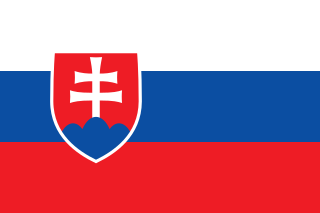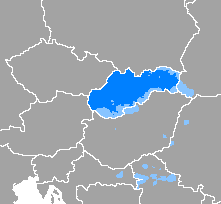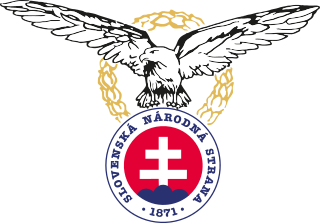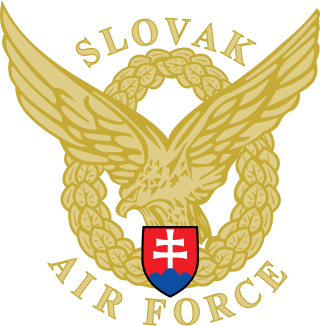
Slovakia, officially the Slovak Republic, is a landlocked country in Central Europe. It is bordered by Poland to the north, Ukraine to the east, Hungary to the south, Austria to the west, and the Czech Republic to the northwest. Slovakia's mostly mountainous territory spans about 49,000 km2 (19,000 sq mi), hosting a population exceeding 5.4 million. The capital and largest city is Bratislava, while the second largest city is Košice.

The economy of Slovakia is based upon Slovakia becoming an EU member state in 2004, and adopting the euro at the beginning of 2009. Its capital, Bratislava, is the largest financial centre in Slovakia. As of Q1 2018, the unemployment rate was 5.72%.

Slovak, is a West Slavic language of the Czech–Slovak group, written in Latin script. It is part of the Indo-European language family, and is one of the Slavic languages, which are part of the larger Balto-Slavic branch. Spoken by approximately 5 million people as a native language, primarily ethnic Slovaks, it serves as the official language of Slovakia and one of the 24 official languages of the European Union.

Direction – Social Democracy, also commonly referred to as Smer, is a left-wing nationalist and left-wing populist political party in Slovakia led by the incumbent prime minister Robert Fico. The party identifies as social-democratic, and was described as a combination of "leftist economics and nationalist appeal".

The Slovakia national football team represents Slovakia in men's international football competition and it is governed by the Slovak Football Association (SFZ), the governing body for football in Slovakia. Slovakia's home stadium from 2019 is the reconstructed Tehelné pole in Bratislava. Historically, up to the split in 1993, the team participated mostly as Czechoslovakia, while it also competed as Slovakia during World War II.

The dissolution of Czechoslovakia, which took effect on December 31, 1992, was the self-determined secession of the federal republic of Czechoslovakia into the independent countries of the Czech Republic and Slovakia. Both mirrored the Czech Socialist Republic and the Slovak Socialist Republic, which had been created in 1969 as the constituent states of the Czechoslovak Socialist Republic until the end of 1989.

The Slovakia men's national ice hockey team is the national ice hockey team of Slovakia and is controlled by the Slovak Ice Hockey Federation. A successor to the Czechoslovakia national team, it is one of the most successful national ice hockey teams in the world. The team's general manager is Miroslav Šatan and their head coach is Craig Ramsay.

The Slovak National Party is an ultranationalist political party in Slovakia. The party characterizes itself as a nationalist party based on both social and European Christian values.

Bratislava M. R. Štefánik Airport, also called Bratislava Airport, located approximately 9 km (5.6 mi) northeast of the city center of Bratislava, spanning over the area of three municipalities. It is the main international airport of Slovakia.

Slovakia has participated in the Eurovision Song Contest seven times, debuting in 1994. It had attempted to debut in 1993, but did not pass through the qualifying round. In the first three finals that Slovakia participated in, it placed no better than 18th, which it achieved in 1996. Due to poor results, Slovakia was relegated in 1995 and 1997, and eventually withdrew in 1999. The country returned in 2009, although it withdrew again within four years, having failed to qualify for the final every year since its return.

Vladimír Weiss is a Slovak football coach and former player who serves as the coach of Slovan Bratislava. He is one of a small number of people to have appeared as a player and a coach at a FIFA World Cup.

The Slovak Air Force, known since 2002 as the Air Force of the Armed Forces of the Slovak Republic, is the aviation and air defense branch of the Slovak Armed Forces. Operating 15 aircraft and 18 helicopters from three air bases : Malacky–Kuchyňa, Sliač, Prešov. It succeeded the Czechoslovak Air Force together with the Czech Air Force in 1993. The Slovak Air Force is part of NATO Integrated Air Defense System – NATINADS.

Bratislava, historically known as Pozsony and Pressburg, is the capital and largest city of the Slovak Republic and the fourth largest of all cities on the River Danube. Officially, the population of the city is about 475,000; however, some sources estimate daily number of people moving around the city based on mobile phone SIM cards is more than 570,000. Bratislava is in southwestern Slovakia at the foot of the Little Carpathians, occupying both banks of the River Danube and the left bank of the River Morava. Bordering Austria and Hungary, it is the only national capital to border two sovereign states.

Juraj Kucka, also known by his nickname Kuco, is a Slovak professional footballer who plays as a midfielder for Slovak club Slovan Bratislava and the Slovakia national team.

Martin Dúbravka is a Slovak professional footballer who plays as a goalkeeper for Premier League club Newcastle United and the Slovakia national team.

Radio and Television of Slovakia, or RTVS, was a nationwide public broadcasting, state-funded organisation in Slovakia.

Jozef Kovalík is a Slovak professional tennis player who competes on the ATP Challenger Tour. He has a career-high ATP singles ranking of world No. 80 and a doubles ranking of No. 245 reached in 2018. He is currently the No. 1 Slovak player.

Peter Pellegrini is a Slovak politician who is serving as the sixth president of Slovakia since 2024. He previously served as prime minister of Slovakia from 2018 to 2020.

Michal Šimečka is a Slovak politician, journalist, and researcher, who served as a Vice-President of the European Parliament between 2022 and 2023. He also became a Member of the European Parliament between 2019 and 2023. In 2020, Šimečka was elected vice-president of the European political group Renew Europe. He is a co-founder of the social-liberal Progressive Slovakia party, leading it from 2022.
















